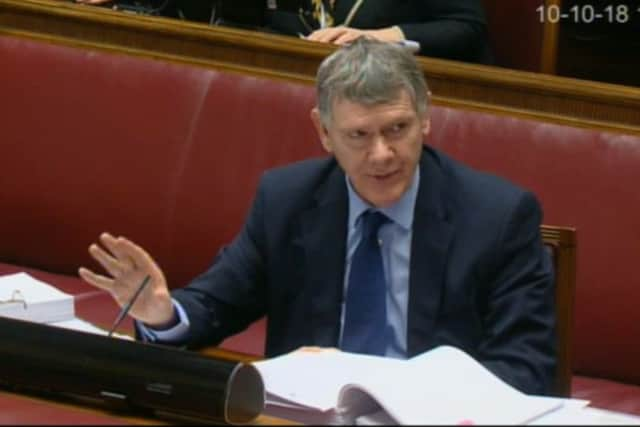RHI Inquiry: It's now crystal clear that Arlene Foster's Spad knew of key flaw, says civil servant
and live on Freeview channel 276
In evidence to the RHI Inquiry yesterday, Andrew McCormick, who as permanent secretary of the Department of Enterprise, Trade and Investment (DETI) was making key decisions in summer 2015 as the scheme ran wildly out of control, criticised two DUP Spads – Mrs Foster’s advis0r Andrew Crawford and Jonathan Bell’s Spad Timothy Cairns.
During yesterday’s hearing, Dr McCormick came under pressure to explain the repeated failures within his department and several actions where he personally should have acted more robustly in that period.
Advertisement
Hide AdAdvertisement
Hide AdDr McCormick, one of Stormont’s most experienced mandarins, was asked about a private July 2015 email from Dr Crawford to Mr Cairns in which he warned there would be “a massive spike” in applications to RHI and referred to “abuse” of the scheme.


In another email, Dr Crawford explicitly said that “it pays producers to heat houses when their houses are empty as the rates are attractive”.
Dr McCormick said he did not recall being warned about such a spike and that “wasn’t part of the discussion” at that point.
He said: “It seems crystal clear from this email that Andrew Crawford understood the perverse incentive in the scheme in a way that we at that time did not. We should have [because] Janette O’Hagan had explained to us in very straightforward terms ... Andrew Crawford clearly understands it: ‘It pays producers to heat houses when their houses are empty as the rates are attractive’.
Advertisement
Hide AdAdvertisement
Hide Ad“That’s a straightforward summary of the fundamental flaw in the scheme.”
Referring to another of Dr Crawford’s emails, Dr McCormick said that the DUP Spad was “even clearer” in his understanding of the issue because “he explains the nature of the abuse that was at the heart of the problem”.
He said: “Why neither Timothy nor Andrew came to us and said: This is what’s happening, here’s why it’s going wrong, here’s why you’ve got a sudden upturn in uptake – if you’d even put that together with [finance official] Trevor Cooper’s points about suspicions about over-compensation, the opportunity for everything to fall into place and for us to realise the nature of the problem that we had and therefore to have acted urgently and to immediately fix it is an incredible lost opportunity.
“I can’t see how there was not a consciousness to bring it to our attention on the part of both Andrew and Timothy.”
Advertisement
Hide AdAdvertisement
Hide AdPanel member Dame Una O’Brien asked: “Do you think it was being kept from you.”
Dr McCormick said: “Yes. Well, that’s what happened. It was kept from us.”
The mandarin went on: “To understand that, to know from the submission that we have a problem and we’re trying to solve the problem and not to say ‘you don’t understand your problem – here’s the real understanding’; is that not straightforwardly withholding information?
“It seems very, very clear to me that it is withholding information that was relevant to the submission that they both had.”
Advertisement
Hide AdAdvertisement
Hide AdMr Cairns did, however, have some discussion with Dr McCormick’s deputy, Chris Stewart, about the issue because Mr Stewart emailed fellow officials a few days later to say that Mr Cairns “is concerned that there may be a further spike in demand”, although he did not use the phrase “massive”.
And Mr Cairns has already told the inquiry that in that period he raised allegations of abuse of the scheme with Mr Stewart but that the department did not take the issue seriously.
Dr McCormick was asked about multiple warnings to his officials about abuse of RHI which were ignored or dismissed. One of those warnings, a letter from boiler installer Solmatix in the summer of 2015, alleged that some “unscrupulous” RHI claimants in the poultry sector were “actively exploiting it”.
He said that should have been raised with the department’s internal auditors and others who could have investigated the allegation, but nothing appears to have been done.
Advertisement
Hide AdAdvertisement
Hide AdThe department had been warned before about a failure to adequately listen to whistle-blowers and claimed that it had learnt lessons.
Dr McCormick said that the evidence presented to the inquiry showed how much “noise” was being made by those contacting the department in different ways to make allegations of abuse or raise concerns about the scheme.
He added: “Why it wasn’t heard – or why if it was heard it wasn’t acted on – I find deeply concerning.”
He said that in the case of the letter from Solmatix, the source of the warning was known to the officials receiving it and therefore it would have had more weight.
Advertisement
Hide AdAdvertisement
Hide Ad“The letter was also referring to ‘not possible abuse – they’re referring to ‘unscrupulous beneficiaries appearing to be actively exploiting it’.”
Dr McCormick said: “It seems to me that a senior manager reading that would say: Stop everything; we need to look at this; we need to understand this; what is going on here?
“We need a very quick assessment as to whether this is spurious – is there any way in which this can be spurious? Or, if there is substance, then we have to ask much more fundamental questions.
“I can’t see how it can be read any other way than [as] something of a serious nature.”